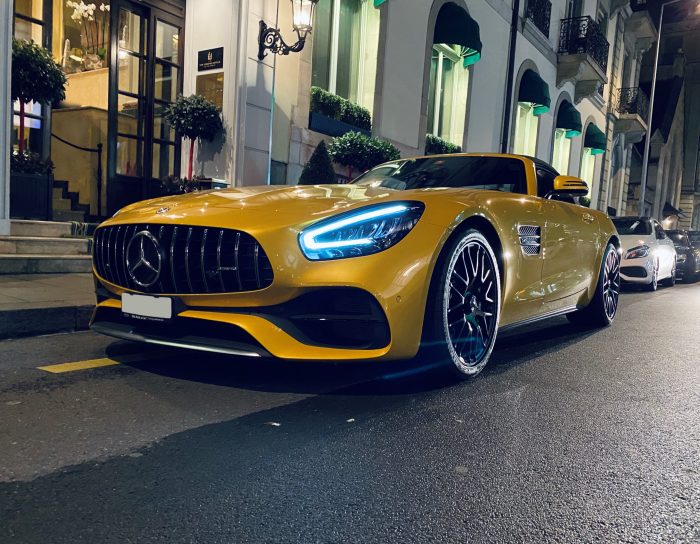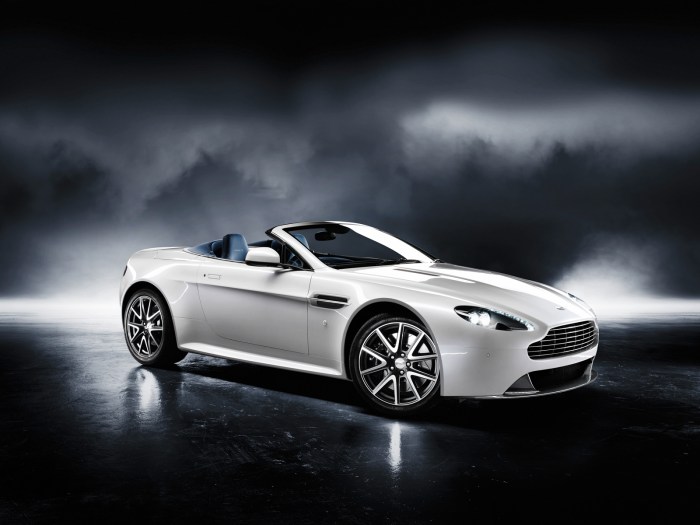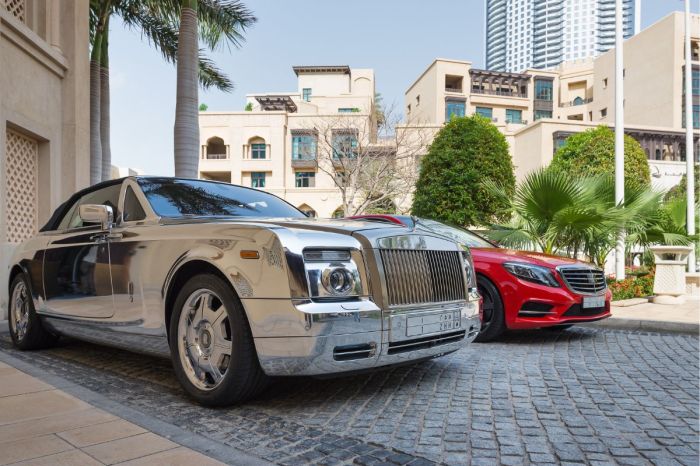Car luxury stands at the pinnacle of automotive craftsmanship, where every detail is meticulously designed to provide an unparalleled driving experience. From plush interiors to cutting-edge technology, luxury cars embody the essence of sophistication and innovation, appealing to those who seek more than just transportation.
The world of luxury automobiles is characterized by unique features that distinguish them from standard vehicles, including advanced safety systems, premium sound systems, and the highest quality materials that evoke a sense of opulence. As the market evolves, understanding the latest trends, top brands, and the intricacies of ownership becomes vital for both enthusiasts and prospective buyers.
Luxury Car Features

Luxury cars embody a blend of performance, comfort, and style, elevating the driving experience to an art form. These vehicles are not merely modes of transportation; they are a statement of sophistication and a showcase of advanced technology. From superior materials to cutting-edge features, luxury cars define the upper echelon of automotive engineering.One of the defining characteristics of luxury cars is their extensive array of features designed to enhance the driving experience.
These features not only provide comfort and convenience but also ensure that the vehicle operates with the utmost efficiency and safety.
Essential Features of Luxury Cars
Luxury cars are equipped with a myriad of features that set them apart from standard models. The following highlights some of the essential elements that contribute to the luxurious nature of these vehicles:
- Advanced Safety Systems: Many luxury cars come with state-of-the-art safety features, including adaptive cruise control, lane-keeping assist, and collision avoidance systems, which provide peace of mind during any journey.
- High-Performance Engines: Luxury vehicles often feature powerful engines that deliver not only speed but also smooth acceleration, ensuring a thrilling driving experience.
- Adaptive Suspension: The ability to adjust the suspension system according to road conditions enhances comfort and handling, making every ride a pleasure.
- Sound Systems: Premium audio systems from renowned brands, providing crystal-clear sound and customizable audio experiences, are standard in most luxury models.
- Smart Technology Integration: These cars are equipped with advanced infotainment systems that seamlessly integrate with smartphones, offering navigation, music, and communication at the driver’s fingertips.
Technological Advancements in Luxury Models
The integration of cutting-edge technology is a hallmark of luxury vehicles. Manufacturers continually innovate, introducing features that enhance not only the driving experience but also convenience and entertainment.
- Autonomous Driving Features: Many luxury brands are leading the charge in autonomous driving technology, offering features such as self-parking and highway driving assistance.
- Heads-Up Displays: Advanced heads-up displays project important information, such as speed and navigation directions, onto the windshield, allowing drivers to keep their eyes on the road.
- Voice-Activated Controls: This feature allows drivers to control various aspects of the car, from navigation to climate settings, using simple voice commands, minimizing distractions.
- Connectivity Features: Luxury vehicles often come with integrated Wi-Fi hotspots, allowing passengers to stay connected while on the move.
Importance of Interior Design and Materials
The interior of a luxury car is a sanctuary that reflects the highest standards of craftsmanship and design. The choice of materials and the overall design aesthetics play a critical role in creating a luxurious ambiance.
- Premium Materials: High-quality leather, fine wood trims, and sophisticated metals are commonly used, providing a tactile sense of luxury and sophistication.
- Ergonomic Design: Seating configurations are designed for maximum comfort, often featuring adjustable settings, massage functions, and heated elements to enhance the driving experience.
- Customizable Interiors: Many luxury brands offer extensive customization options, allowing owners to choose colors, materials, and finishes that reflect their personal taste.
- Ambient Lighting: Thoughtfully designed ambient lighting creates a serene atmosphere, enhancing the overall aesthetic of the car’s interior.
“Luxury is in each detail.” – Hubert de Givenchy
Market Trends in Luxury Cars

The luxury car market is currently experiencing transformative trends that are reshaping consumer preferences and industry dynamics. As a result, manufacturers are adapting their strategies to meet the evolving demands of affluent buyers. This analysis delves into the key trends driving the luxury car market, particularly focusing on the shift towards electric vehicles and the demographic details of luxury car purchasers.
Current Trends Influencing the Luxury Car Market
The luxury car market is witnessing several notable trends that reflect changing consumer behavior and technological advancements. Key influences include:
- Electrification: A significant movement towards electric luxury vehicles (ELVs) is evident, with brands like Tesla, Audi, and Porsche leading the charge. The global push for sustainability is prompting consumers to opt for vehicles that align with their eco-conscious values.
- Autonomous Driving Features: Advanced driver-assistance systems (ADAS) are becoming standard in luxury models. Brands are investing in technology that enhances driving comfort and safety, appealing to tech-savvy customers.
- Customization: There is a growing demand for bespoke features and personalized options, allowing consumers to tailor vehicles to their preferences. This trend underscores the desire for exclusivity and individuality among luxury buyers.
- Experience Over Ownership: Many affluent consumers are prioritizing experiences, leading to a rise in luxury car subscriptions and rentals rather than outright purchases. This trend reflects a shift in how luxury is perceived.
Sales Growth of Electric Luxury Vehicles Versus Traditional Luxury Cars
The market is witnessing a stark contrast in growth rates between electric luxury vehicles and traditional luxury cars. In recent years, the sale of electric luxury vehicles has surged, outpacing the traditional luxury car segment significantly.
In 2022, electric vehicle sales in the luxury segment grew by 70%, while traditional luxury car sales saw a modest increase of 10%.
This shift can be attributed to increasing environmental awareness among consumers and favorable government policies promoting electric vehicle adoption. High-performance electric models like the Lucid Air and the Rivian R1T are gaining traction, demonstrating that EVs can compete with traditional luxury vehicles not only in sustainability but also in performance and luxury.
Consumer Demographics Purchasing Luxury Cars
Understanding the demographics of luxury car purchasers is crucial for manufacturers aiming to tailor their marketing strategies effectively. The demographic landscape is evolving, showcasing diverse segments:
- Affluent Millennials: This group is increasingly influential, often prioritizing technological features and sustainability in their luxury car choices. They value brands that reflect their lifestyle and values, particularly those that offer electric options.
- High-Net-Worth Individuals (HNWIs): Traditionally, this demographic remains a primary buyer of luxury cars, with a focus on performance and exclusivity. Their purchasing power allows them to invest in high-end brands like Rolls-Royce and Bentley.
- Women Buyers: The luxury car market is seeing a rise in female buyers, who tend to favor vehicles that combine luxury with practicality. Brands are increasingly targeting this segment by offering models that appeal to their preferences.
These trends highlight the necessity for luxury car manufacturers to adapt their offerings and marketing efforts to cater to the changing landscape of consumer demographics and preferences.
Top Luxury Car Brands: Car Luxury
The luxury car market has long been defined by a handful of prestigious brands that have shaped the landscape through innovation, performance, and design. These manufacturers not only produce vehicles that are synonymous with wealth and status, but they also set the benchmark for quality and technological advancement in the automotive industry. This segment delves into the histories, unique offerings, and brand loyalty associated with the leading names in luxury cars.
History and Reputation of Leading Luxury Car Manufacturers
The legacy of luxury car manufacturers is often rooted in their long-standing traditions and pioneering achievements. Brands such as Mercedes-Benz, BMW, Audi, and Rolls-Royce have carved out their niches through a combination of heritage and forward-thinking design.
- Mercedes-Benz: Founded in 1926, Mercedes-Benz has been at the forefront of automotive innovation, known for introducing features such as anti-lock braking systems and stability control. Its reputation for luxury is exemplified by the flagship S-Class, often regarded as the benchmark in luxury sedans.
- BMW: With a history dating back to 1916, BMW stands for “Bayerische Motoren Werke.” The brand is celebrated for its performance-oriented models, particularly the 7 Series, which blends luxury with driving dynamics that appeal to enthusiasts.
- Audi: Established in 1909, Audi has gained recognition for its Quattro all-wheel-drive system, enhancing performance and safety. The A8 serves as Audi’s luxury flagship, showcasing cutting-edge technology and a focus on comfort.
- Rolls-Royce: With roots stretching back to 1904, Rolls-Royce epitomizes ultimate luxury and craftsmanship. The Phantom, often called the “best car in the world,” is a symbol of exquisite luxury, offering bespoke customization options that cater to individual tastes.
Unique Offerings of Each Brand
Luxury car brands distinguish themselves through unique offerings that often reflect their brand philosophies and target markets. These features go beyond mere aesthetics, encompassing performance, technology, and customer experience.
- Mercedes-Benz: Known for its luxurious interiors and top-notch safety features, the brand offers an extensive array of models, including hybrid and electric options in their EQ lineup. The MBUX infotainment system stands out for its voice recognition capabilities.
- BMW: The brand emphasizes a driver-focused experience with its “Ultimate Driving Machine” motto. Features like adaptive suspension and dynamic steering contribute to an engaging driving experience, while their iPerformance models focus on sustainability without sacrificing performance.
- Audi: Audi’s signature Virtual Cockpit provides a futuristic interface that enhances driving experience and safety. The brand’s commitment to technology is reflected in its development of electric models like the e-tron series, pushing the boundaries of luxury EVs.
- Rolls-Royce: Rolls-Royce offers unparalleled customization options, allowing customers to personalize their vehicles extensively. The brand’s hallmark is its hand-crafted interiors, with every detail reflecting the buyer’s taste, from the choice of wood to personalized embroidery.
Brand Loyalty Among Luxury Car Buyers, Car luxury
The luxury car market experiences strong brand loyalty, largely due to the emotional connections that consumers develop with these prestigious brands. Buyers often choose luxury cars not only for their performance and features but also for the lifestyle and status that accompany ownership.
- Emotional Attachment: Many luxury car owners view their vehicles as extensions of their identities, leading to strong brand allegiance. This emotional connection is often reinforced through exceptional customer service and a community of like-minded individuals.
- Repeat Purchases: Based on surveys, a significant percentage of luxury car buyers tend to repurchase from the same brand, citing satisfaction with their previous models and the overall brand experience.
- Loyalty Programs: Brands like Mercedes-Benz and BMW offer loyalty programs that reward customers for repeat purchases and provide exclusive access to events, further enhancing brand attachment.
- Influence of Heritage: The storied histories of brands like Rolls-Royce and Bentley contribute to a sense of prestige and trustworthiness, encouraging buyers to remain loyal across generations.
Luxury Car Maintenance and Ownership
Owning a luxury vehicle is not merely about the initial purchase; it encompasses a range of responsibilities that ensure the car remains in optimal condition throughout its lifespan. Understanding the maintenance requirements and associated costs is crucial for any luxury car owner. This segment delves into the specifics of maintaining luxury automobiles, the ongoing financial commitments involved, and essential tips for preserving their performance and longevity.
Maintenance Requirements for Luxury Vehicles
Luxury cars often require specialized maintenance due to their advanced technologies, high-end materials, and performance capabilities. Regular maintenance is essential to keep these vehicles operating smoothly and preserve their resale value. Key aspects of luxury car maintenance include:
- Routine Service Checks: Regular oil changes, tire rotations, and brake inspections are critical. Most luxury brands recommend service intervals between 7,500 to 10,000 miles, depending on the model and usage.
- Specialized Care: Luxury vehicles frequently utilize premium parts and fluids. Using manufacturer-specific oils and components ensures optimal performance and reliability.
- Software Updates: Many luxury cars are equipped with advanced infotainment and diagnostic systems that require periodic software updates to maintain functionality and enhance features.
- Detailing and Exterior Care: Regular detailing, including wax treatments and ceramic coatings, helps protect the paint and finish from environmental damage, ensuring the car looks pristine.
Costs Associated with Owning a Luxury Car
Owning a luxury car involves various costs that extend beyond the initial purchase price. Potential owners should be aware of these ongoing expenses to manage their budgets effectively:
- Insurance Premiums: Luxury vehicles typically incur higher insurance costs due to their value and repair expenses. Comprehensive coverage is often recommended, which can lead to premiums exceeding $2,000 annually.
- Maintenance and Repairs: Routine maintenance can cost significantly more than standard vehicles. For example, luxury brake replacements can range from $1,000 to $3,000, depending on the model.
- Fuel Costs: Luxury cars often require premium fuel, which can lead to higher fuel expenses. For instance, a luxury sedan may average 15-25 miles per gallon, impacting fuel budget calculations.
- Depreciation: Luxury cars tend to depreciate faster than regular vehicles, with some models losing up to 50% of their value within three years. Understanding this can influence resale strategies.
Ensuring Longevity and Performance
To maximize the lifespan and performance of a luxury automobile, owners should adopt specific best practices and preventative measures. These strategies can enhance the vehicle’s reliability and maintain its aesthetic appeal:
- Follow Manufacturer Guidelines: Adhering to the maintenance schedule Artikeld in the owner’s manual ensures that all necessary checks and services are performed on time.
- Invest in Quality Parts: When repairs are necessary, using high-quality or OEM (Original Equipment Manufacturer) parts is crucial for maintaining performance and avoiding further issues.
- Monitor Driving Habits: Gentle acceleration and braking can reduce wear on components. Limiting aggressive driving can significantly extend the life of the engine and transmission.
- Regularly Inspect Tires: Maintaining proper tire pressure and performing regular alignments can lead to better fuel efficiency and tire longevity.
“Maintaining a luxury car requires diligence and investment, but the rewards in performance and enjoyment are well worth the effort.”
The Future of Luxury Cars

The future of luxury cars is poised to be a captivating blend of innovative design, cutting-edge technology, and a commitment to sustainability. As the automotive industry evolves, luxury brands are not only enhancing performance and comfort but are also redefining what it means to own a luxury vehicle. This transformation is largely driven by advancements in technology and a growing emphasis on environmental responsibility.The anticipated innovations in luxury car design and technology are set to revolutionize the driving experience.
Advanced materials, smart systems, and electrification are at the forefront of this evolution, offering enhanced performance while ensuring luxury cars remain environmentally compliant.
Innovations in Luxury Car Design and Technology
The luxury car segment is increasingly focused on integrating technology that elevates both functionality and user experience. Upcoming trends include:
- Electric and Hybrid Vehicles: Major luxury brands are shifting towards fully electric and hybrid models. For instance, brands like Tesla and Porsche are leading the charge with electric SUVs that offer superior performance without compromising luxury.
- Connected Car Technology: Features such as advanced infotainment systems and over-the-air updates enhance connectivity and convenience, exemplified by Mercedes-Benz’s MBUX system, which adapts to user preferences.
- Autonomous Driving: Luxury manufacturers are heavily investing in autonomous driving capabilities. Brands like Audi and BMW are actively testing and implementing self-driving technology, creating a new standard for safety and comfort.
- Augmented Reality Dashboards: Innovations such as augmented reality displays are set to enhance navigation and information accessibility, providing real-time data in an easily digestible format.
Sustainability in Luxury Vehicle Production
Sustainability has become a critical focus for luxury car manufacturers, who are increasingly integrating eco-friendly practices into their production processes. This shift is not only a response to consumer demand but also a commitment to reducing the carbon footprint of luxury vehicles.Luxury automakers are exploring sustainable materials, such as recycled plastics and organic composites, to reduce environmental impact. For example, brands such as Volvo and BMW have made significant strides in using sustainably sourced materials in their interiors.
Moreover, the production processes themselves are being reimagined to minimize waste and energy consumption. For instance, Tesla’s Gigafactory emphasizes renewable energy sources, which aligns with their mission to accelerate the world’s transition to sustainable energy.
“The luxury car of the future will be just as much about ethical responsibility as it is about performance and comfort.”
Shifts in Consumer Preferences in the Luxury Segment
As consumer preferences evolve, luxury car manufacturers are adapting their offerings to meet the changing demands of their clientele. Today’s luxury consumers are more informed and concerned about sustainability, personalization, and technology integration.The rise of personalized luxury experiences is driving manufacturers to offer customizable options that cater to individual tastes. Brands like Aston Martin and Bentley are known for their bespoke services, allowing customers to tailor everything from interior materials to performance specifications.Furthermore, there is a noticeable trend towards mobility solutions rather than traditional car ownership.
Subscription services and car-sharing platforms are becoming more popular, especially among younger luxury consumers who value flexibility. Companies such as BMW’s “Access by BMW” service allow users to experience a range of vehicles without long-term commitments.The luxury automobile industry is entering an era defined by cutting-edge technology, sustainable practices, and evolving consumer preferences, making the future of luxury cars an exciting landscape to watch.